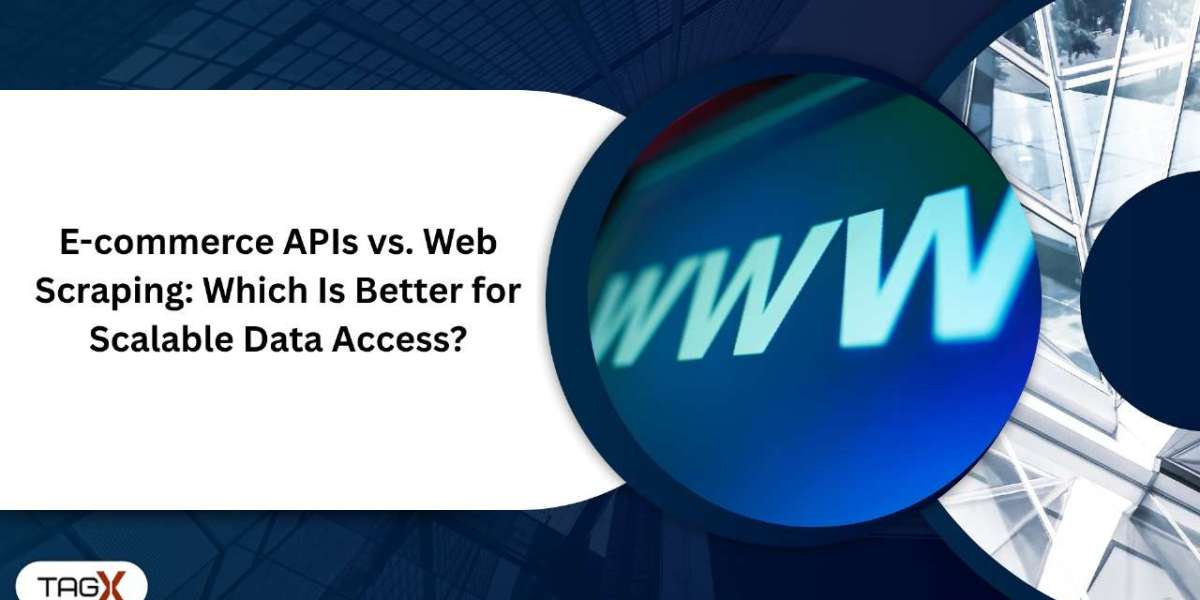In today’s digital-first world, access to reliable and scalable data determines who leads the market and who gets left behind. Businesses rely on large-scale data collection to make decisions about pricing, inventory, customer sentiment, and competition. Two of the most powerful approaches for gathering this data are E-commerce APIs and web scraping.
Both methods aim to achieve the same goal — providing businesses with structured, actionable insights — but they differ greatly in how they source, scale, and deliver data. This article explores the pros and cons of each, when to use them, and how TagX helps companies combine both for maximum data impact.
Understanding E-commerce APIs
An E-commerce API (Application Programming Interface) is a bridge that allows one software system to communicate with another in a structured and secure way. Many major marketplaces, such as Amazon, Shopify, and eBay, provide APIs that enable developers to access product data, pricing, reviews, and inventory in real time.
APIs are like official data channels — clean, organized, and consistent. They’re built by the platform itself, ensuring that the data you receive is accurate and up-to-date. When used correctly, APIs allow companies to automate data workflows, build dashboards, or feed data into analytics systems without manual effort.
Benefits of E-commerce APIs
The biggest advantage of APIs lies in their data reliability. Since the information comes directly from the source, it’s typically error-free and well-structured. APIs also reduce maintenance headaches because the provider handles changes on their end, ensuring smooth data delivery even when the platform evolves.
APIs are also highly secure. They use authentication keys, permissions, and usage limits to ensure responsible data access. This makes them ideal for businesses that prioritize compliance and need consistent, regulated access to specific datasets.
However, APIs have limitations. Not every e-commerce site offers one, and when they do, it may expose only a limited portion of data — for instance, product titles and prices, but not customer reviews or sales velocity. Some APIs also restrict how many requests you can make per hour, which can slow down large-scale operations. In addition, access often requires approval or payment, making it less flexible for smaller businesses.
Understanding Web Scraping
Web scraping takes a more open-ended approach to data collection. Instead of relying on an official interface, it uses automated tools or bots to extract data directly from publicly available web pages. A scraper reads the HTML code of a webpage and identifies relevant information such as product names, prices, reviews, or images.
This method gives businesses the freedom to collect data from virtually any online source, regardless of whether an API exists. It’s particularly useful for competitive research, price monitoring, and sentiment analysis — scenarios where data is scattered across multiple platforms.
Benefits of Web Scraping
The key advantage of web scraping is flexibility. You can gather exactly the information you need, in whatever structure you prefer, from a wide variety of sources. It’s also excellent for achieving comprehensive coverage — combining data from multiple marketplaces, retailers, or regions for a holistic market view.
Web scraping also supports real-time insights. Businesses can track competitor price changes, analyze customer reviews, or monitor product availability the moment it happens. It enables dynamic intelligence that helps brands adapt quickly in fast-moving markets.
However, scraping requires a well-managed infrastructure. Websites frequently change layouts or introduce anti-bot measures, so scrapers must be updated regularly. Ethical and legal compliance is also essential — scraping personal data or breaching a site’s terms of service can lead to serious risks. Responsible data collection practices are non-negotiable.
Comparing E-commerce APIs and Web Scraping
Both APIs and scraping serve distinct purposes in the data ecosystem. APIs are perfect when you need official, structured, and consistent data from platforms that support them. They excel in environments where stability and compliance matter most — such as inventory synchronization, performance tracking, or catalog management.
On the other hand, web scraping is ideal when you need comprehensive and flexible access to public information. If your business depends on cross-platform comparison, market research, or product review analysis, scraping offers unmatched coverage.
In terms of scalability, both can operate at massive levels — but through different mechanisms. APIs scale through efficient request management and stable endpoints, while scraping scales by deploying multiple bots that collect data simultaneously. The right choice depends on your goals, technical capacity, and the nature of the data you seek.
APIs deliver precision and reliability; scrapers deliver reach and adaptability. When used together strategically, they create a complete and powerful data acquisition framework.
When to Use E-commerce APIs
E-commerce APIs are best suited for businesses that require:
- Structured and accurate data that can be integrated directly into internal systems.
- Real-time synchronization with product listings, stock updates, or pricing data.
- Long-term reliability without the need for constant maintenance.
- Guaranteed compliance with the platform’s rules and data privacy standards.
For instance, a global retailer might use the TagX E-commerce Data API to integrate live product and inventory data from top marketplaces. This ensures accurate and consistent information across all sales channels, enabling smarter pricing and logistics decisions.
When to Use Web Scraping
Web scraping becomes invaluable when:
- You need data from platforms that don’t provide APIs.
- You want competitor and market intelligence from multiple sources.
- You’re monitoring customer sentiment through product reviews or discussions.
- You need to capture niche or long-tail data not available through official feeds.
For example, a market research agency might use TagX’s web scraping solutions to collect product reviews and consumer sentiment from smaller e-commerce stores and forums. This type of data would be unavailable through APIs but critical for identifying trends and opportunities.
Combining Both for Scalable Data Access
The most powerful approach isn’t choosing one method over the other — it’s combining both. APIs deliver structured, authorized data, while web scraping provides the flexibility to fill in the gaps. Together, they ensure complete coverage, accuracy, and reliability.
That’s exactly what TagX offers. TagX builds hybrid data solutions that blend E-commerce APIs and intelligent web scrapers into unified pipelines. This means clients can collect official data from marketplaces, complement it with scraped insights from other sites, and process it all in one place — cleanly, efficiently, and at scale.
Compliance and Ethical Data Practices
Whether you use APIs or web scraping, compliance must always be the foundation of your data strategy. APIs naturally enforce usage rules and data-sharing limits, making them inherently compliant. Scraping, however, requires careful planning. Businesses must respect each website’s terms of service, use rate limits, and avoid collecting personal or private information.
TagX ensures that every data collection process it implements follows global privacy regulations such as GDPR and CCPA. Ethical scraping and responsible data handling are at the core of every TagX solution, allowing clients to scale confidently without legal or reputational risks.
Conclusion
In the debate between E-commerce APIs and web scraping, there’s no one-size-fits-all answer. Both are valuable — just for different reasons.
- Use E-commerce APIs when you need structured, reliable, and compliant data access.
- Use web scraping when you need flexibility, wider coverage, and custom data extraction.
- Combine both to achieve the most scalable, accurate, and insightful data ecosystem possible.
In a world where data is the new currency, choosing the right access method defines your competitive advantage. With TagX, you don’t have to choose — you get the best of both worlds.



